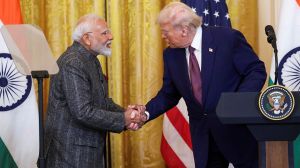A course in recuperation
MOSCOW, Oct 28: Boris Yeltsin, looking more isolated than ever, underwent a second day of sanatorium treatment for exhaustion today and o...

MOSCOW, Oct 28: Boris Yeltsin, looking more isolated than ever, underwent a second day of sanatorium treatment for exhaustion today and one of his top aides said the president no longer had day-to-day control of Russia.
The Kremlin said the 67-year-old leader, who has a history of poor health and had heart bypass surgery two years ago, was still at the Barvikha Medical Centre west of Moscow and plans for a holiday to recuperate further had yet to be finalised.
While Yeltsin recovers from what doctors say is asthenia 8212; fatigue and high blood pressure 8212; stemming from an earlier bout of bronchitis, opposition figures and allies have become more outspoken about his plight at a time of deep economic crisis.
8220;The government is now fully responsible for the economy,8221; deputy Kremlin chief of staff Oleg Sysuyev said in an interview published in the daily newspaper Sevodnya today.
8220;The most important task for the president is to turn over stable power to his successor. He no longer has the right tobe distracted by day-to-day issues.8221;
He said Yeltsin would serve out his elected term to mid-2000 overseeing constitutional reform in the world8217;s largest country.
Russia8217;s constitution was made to order for Yeltsin in 1993 after parliament attempted a rebellion, and guarantees the president extremely broad powers.
Although Yeltsin8217;s grip on the executive may be slipping, he still jealously guards his control over Russia8217;s nuclear arsenal and the so-called power ministers; defence, foreign affairs, the interior and the intelligence services.
Yevgeny Primakov, a former foreign minister and spy chief, has already amassed considerable influence since being made prime minister six weeks ago. He deputised for Yeltsin at talks with the European Union in Vienna yesterday and is openly described in the Russian media as an effective vice-president.
Primakov, who is a year older than Yeltsin, has won wide respect for bringing political stability to Russia. Yet he has still not unveiled his plan to pull thecountry out of its worst crisis since the collapse of the Soviet Union, although he has promised to do so by the end of this week.
A leaked draft version has done little to impress would-be foreign investors and creditors, although Primakov said the EU had no significant objections in Vienna.
- 01
- 02
- 03
- 04
- 05































